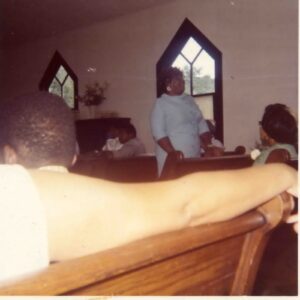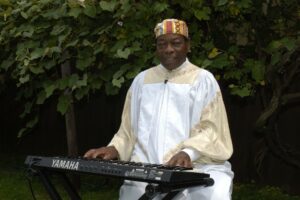Those scriptures have been a part of my life, and it is so real, if we live in obedience to God’s word, there will be life hereafter, something we can look forward to.
Stories
That Ole Mountain – Mills Chapel Baptist (9.12.2012)
My earliest memories of Black Sacred Music are from those days when I was growing up in the Baptist Church in the small town of Black Mountain located in the Southern Appalachian Region of Western North Carolina. Hearing those old hymns bring back fond memories the church elders who gave us unconditional love, taught us skills to endure adversity, and encouraged us to pursue our dreams.
This Little Light of Mine – Pastor Hill (2.26.2014)
I love that song, because it depicts scripture as well, Jesus told his disciples then and now that we are to let our light shine before men. So This Little Light of Mine is one of my favorite songs ‘cause sometimes when you are down and when your mind might be reflecting or thinking on things, when you’re hurting, or you’re pressured. . .
Amazing Grace (3.2.2014)
When I was on the farm, that was stressful, I said Lord if you get me off this farm and mama and daddy off too, I’ll praise you all the days of my life.
Hide Behind that Ole Mountain (2.24.2014)
Jesus is the mountain, when you’re having troubles, all you have to do is hide behind the mountain. He’ll be your protection.
I remember it well, I was attending the Homegoing Service for the mother of a long-time friend and colleague. The Service was held in a small church in a rural town in Eastern North Carolina. I had some trouble finding the church so when I arrived I had to take a seat near the rear of the church. The service was moving along smoothly with the usual words from the ministers, then a prayer, and a song from the choir. And then, we came to the time on the program for family and friends to share words of comfort with members of the family. An older man sitting behind me proceeded to walk to the front of the church. He walked over and whispered something to the family member sitting on the front pew. He then walked over to the mic just in front of the pulpit and started to sing. He was singing without any musical instruments and with his shaky and solid voice sang his song to the family. This song was his “gift” his offering of support to comfort the family. There I sat, in the back of the church watching in amazement. Thinking, how beautiful the song, the singer, and this gift of comfort to this grieving family. I also remember leaving that church wanting to somehow capture that piece of African American culture, African American religious tradition that might be lost with this generation.
 Singing in the church was not new to me. I grew up in the church. In fact, the church for this particular Homegoing Service was very similar to the one in which I was reared. Growing up in the church, we learned to sing religious songs at a very early age. We sang hymns in Sunday School, Sunday Worship Services, and Baptist Training Union (BTU). My memories are more vivid, however, of the religious songs we sang in the small elementary school that I attended during the 50’s and 60’s. During daily devotion at Carver Elementary School we learned to sing hymns and children’s Bible songs. The hymn that I recall some 50 years later is I Come to the Garden Alone. I can also recall many childrens’ Bible songs: Jesus loves the little children; The rain came down and the floods came up; Jesus loves me; Do Lord; He’s got the whole world in His hands; to name a few. As I reflect back on those songs, it now appears that as children we were being taught to think of ourselves as children of God, that God loved us and would be there for us when we needed Him . . . And He walks with me and He talks with me and He tells me I am His own, and the joy we share as we tarry there, none other has ever known. Reflecting back on my childhood, these songs taught us important life lessons, but as I sat there in the back of this church, in this rural town in Eastern North Carolina, I was observing the use of a religious song for a very different purpose.
Singing in the church was not new to me. I grew up in the church. In fact, the church for this particular Homegoing Service was very similar to the one in which I was reared. Growing up in the church, we learned to sing religious songs at a very early age. We sang hymns in Sunday School, Sunday Worship Services, and Baptist Training Union (BTU). My memories are more vivid, however, of the religious songs we sang in the small elementary school that I attended during the 50’s and 60’s. During daily devotion at Carver Elementary School we learned to sing hymns and children’s Bible songs. The hymn that I recall some 50 years later is I Come to the Garden Alone. I can also recall many childrens’ Bible songs: Jesus loves the little children; The rain came down and the floods came up; Jesus loves me; Do Lord; He’s got the whole world in His hands; to name a few. As I reflect back on those songs, it now appears that as children we were being taught to think of ourselves as children of God, that God loved us and would be there for us when we needed Him . . . And He walks with me and He talks with me and He tells me I am His own, and the joy we share as we tarry there, none other has ever known. Reflecting back on my childhood, these songs taught us important life lessons, but as I sat there in the back of this church, in this rural town in Eastern North Carolina, I was observing the use of a religious song for a very different purpose.
 Prior to attending this Homegoing Service, I had conducted research to document the unique ways in which older African Americans use social support in response to life-threatening illness such as cancer. Historically, African Americans have survived through their engagement in a dynamic process of giving and receiving social support among their relationships with family and friends. When support is given, it is also received. These dynamic supportive relationships are complex and characterized by the relationship, the type support, and timing of the exchange. Social support might be exchanged among two closely related individuals during a short time frame. However, these dynamic supportive relationships have also occurred over extended periods of time and functioned to sustain African Americans for generations. Through these relationships, family member and friends shared what they possessed, their talents, and services to help those in need. Unique to this system of supportive relationships among African Americans, however, was the perception of God as a source of support. God provides support not available from their social networks of family and friends and their relationship with Him is very real, close, and intimate. For the African Americans in previous research and also in this project, God has been a trusted and reliable source of support, there to heal, protect, strengthen, and comfort during their struggles.
Prior to attending this Homegoing Service, I had conducted research to document the unique ways in which older African Americans use social support in response to life-threatening illness such as cancer. Historically, African Americans have survived through their engagement in a dynamic process of giving and receiving social support among their relationships with family and friends. When support is given, it is also received. These dynamic supportive relationships are complex and characterized by the relationship, the type support, and timing of the exchange. Social support might be exchanged among two closely related individuals during a short time frame. However, these dynamic supportive relationships have also occurred over extended periods of time and functioned to sustain African Americans for generations. Through these relationships, family member and friends shared what they possessed, their talents, and services to help those in need. Unique to this system of supportive relationships among African Americans, however, was the perception of God as a source of support. God provides support not available from their social networks of family and friends and their relationship with Him is very real, close, and intimate. For the African Americans in previous research and also in this project, God has been a trusted and reliable source of support, there to heal, protect, strengthen, and comfort during their struggles.
 At this Homegoing Service, I was witness to an older man singing a religious song about God’s love to comfort a grieving family. I was later told by the family that this man was a long-time family friend, and singing this song was his gift to comfort them during the loss of their mother. The hymn he was singing were words of comfort; what he had to give to a family graciously received it. Had I been able to interview the older man who sat in the back of the church, I would have recorded the lyrics to the song. I would have also asked about the meaning of the lyrics in that particular song and why he supported the family in this way.
At this Homegoing Service, I was witness to an older man singing a religious song about God’s love to comfort a grieving family. I was later told by the family that this man was a long-time family friend, and singing this song was his gift to comfort them during the loss of their mother. The hymn he was singing were words of comfort; what he had to give to a family graciously received it. Had I been able to interview the older man who sat in the back of the church, I would have recorded the lyrics to the song. I would have also asked about the meaning of the lyrics in that particular song and why he supported the family in this way.
I left that Homegoing Service sure of one thing. Somehow, I was going to explore the use of religious songs in response to present day struggles. Conducting a research study to explore the use of religious songs seemed a stretch from the research I had previously done as a Nurse Scientist. I spent the next few weeks talking to colleagues and thinking through how to get started. I truly struggled with how to get started. Where would I recruit people to interview, what questions would I ask? Then, one day as I was driving on a stretch of Highway 40 near Hickory, North Carolina, the answer came. I had turned the radio off and even rolled down the windows for the fresh air and to think. Seemingly from nowhere, the thought came to me. As a scientist, I knew how to conduct interviews. I knew how to analyze the interviews. I had ideas of where to recruit older African Americans. You can do this I thought.
